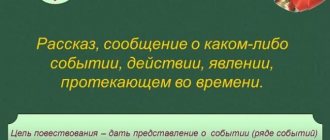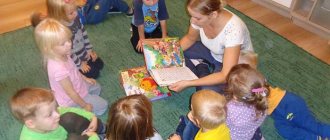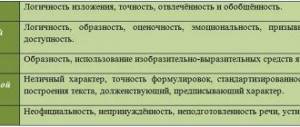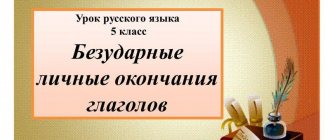Cards in the Russian language on the topic “Parts of speech” for grades 2 - 3 card index (grade 3) on the topic
Russian language cards on the topic “Parts of speech” for grades 2 – 3.
No. 1. Read the text. Write down nouns in the first column, verbs in the second, and adjectives in the third.
Fluffy snow is falling. Houses and trees were dressed in snow. Joyful children welcome winter.
No. 2. 1. Read the sentences. Write down the words with the same root and write the questions they answer. Indicate what parts of speech these words are.
- Miners extract gold. 2. The winner was awarded a gold cup.
3. The sun gilds the tops of the trees.
- Underline the endings of the written words.
No. 3. 1. From these words, make sentences about snow and about guys.
Today, the guys are cheerful, playing, snowballs, fluffy snow, in the yard.
2. Underline nouns with one line, verbs with two lines, and adjectives with a wavy line.
No. 4. Write down pairs of nouns that are similar in meaning.
Sample. Twilight and darkness.
Twilight, heat, noise, fun, storm, laughter, darkness, heat, roar, joy, smile, hurricane.
No. 5. Copy the text. Write down the adjectives they are associated with along with the nouns. Write questions in brackets. Check the endings of adjectives with the endings of questions.
Sample. The cloud is (what?) black.
A black cloud covered the sun. Thick dust rose on the road. The aspen grove began to tremble. Bright lightning flashed. Large drops of rain fell.
No. 6. 1.Copy down the sentences. Instead of dots, insert the adjectives spirit, fragrant, stuffy.
1. I was playing in the park. . . orchestra. 2. My sister was given a bouquet. . . lilies of the valley 3.B. . . you can't sleep in the room.
2. Come up with and write sentences with the adjectives furry, downy, fluffy.
No. 7. 1. Write down verbs with opposite meanings in pairs. Write down the questions they answer.
1. Summer stores, and winter eats. 2. Peace builds, but war destroys. 3. The brave will find where the timid will lose. 4. A person gets sick from idleness, but gets healthy from work.
2. Write down other words of opposite meaning in pairs. Indicate the parts of speech.
No. 8. Write it off. Underline the endings of questions and verbs.
1. The girl (what was she doing?) was playing. 2. The sun (what was it doing?) was playing. 3. The children (what were they doing?) were playing.
No. 9. Read the text. Write out the subject and predicate from each sentence. Insert the endings of the verbs: - o, - a, -i. Emphasize the endings.
It's... morning. The last star has already gone out. At the top of the spruce the rays of the sun began to play. The sun rose... over the forest. The dew sparkled... with all the colors of the rainbow. Under the weight of the tractors... the earth began to hum. Near the river lay... a green field.
No. 10. 1.Copy down the sentences. Change the data in parentheses to make predicates according to meaning.
1. The sun (illuminate) the clearing. 2.The river (sparkle) in the sun. 3. Swallows are having fun (twitter).
2. Underline the endings of the verbs.
No. 11. 1. Make sentences with these verbs.
Entered (in what?), climbed (on what?), went in (for whom?), dressed (whom?), put on (what?).
- Underline the prefixes in the verbs.
No. 12. Write down the sentences. Place no in front of the verbs to make a proverb.
Sample. If you don’t stretch out your hand, you won’t even get a spoon.
- If you stretch out your hand, you will get a spoon. 2. If you work hard, you will eat bread. 3. If you look, you will see, if you ask, you will find. 4. He who works, eats. 5. He who sows also winnows. 6. If you grow vegetables, cook cabbage soup.
No. 12. Write about how to take care of a book. Underline not with verbs.
Sample. Don't bend the binding of the book.
No. 13. 1. Write down nouns in the first column, verbs in the second, and adjectives in the third.
Awakening of flowers.
Here the yellow salsify opens its petals. Behind him, a wild rose opens its wide petals. The poppy flares up with bright fire. The dandelion raises its golden head. Later, the red wild carnation opens its petals. Behind her, a water lily opens its snow-white corolla.
According to V. Vetlina.
2.Write what the words of each part of speech mean. What questions do they answer?
No. 14. 1. Match these nouns with the same root adjectives and verbs.
Honor, sadness, frost, heat, light, view, pain, salt.
2.Indicate the parts of speech.
Sample. Honor (n.), honor (v.), honest (adj.).
No. 15. 1. Choose other nouns that are similar in meaning to the highlighted nouns.
Labor, blizzard, storm, heat, work, blizzard, heat, hurricane, heat, whirlwind, occupation.
- Underline the nouns that denote natural phenomena.
No. 16. Write down masculine nouns in one column, feminine in another, neuter in the third. Insert the missing letters.
For...ts, s...tank, gn...zdo, m...l...ko, k...rowa, r...bota, m...tro, ...reh, alley, p...goda, b...lotto, s...scrap, driver, p ...midor, space, apple.
No. 17. Write down a couple of words. Fill in the missing endings.
Honestly... Favorite things… . Bright sun... . Clear skies... . Ripe apples... Cherry jam… . New dress... Warm blankets… .
No. 18. Write riddles and answers to them. Underline their endings.
In the summer in a fur coat, and in the winter naked. What is higher than the forest, more beautiful than the light? Fluffy cotton wool floats somewhere. Lives without a body, speaks without a tongue.
Guess: sun, tree, cloud, echo.
No. 19. Write down the sentences. Insert the missing letters. Underline the endings of neuter nouns.
A joyful life makes hearts happy... . Red floor...birth...yu. Don't decorate your dress... decorate your mind. Mind and health... all the best.
No. 20. Copy the text. Insert the missing letters. Specify the gender of the nouns.
Morning has come... The sun is shining brightly... . Clear skies... . A white cloud floats across it... . In front of me is a tall tree… . This is an apple tree. Here a ripe apple fell... Behind the garden there is a floor… .
No. 21. Write down the sentences. Insert appropriate nouns. Indicate the gender of nouns.
Horses were racing along the road. The cranes were flying high. There were... cows grazing near the river.
Words to insert: flock, herd, herd.
No. 22. Make up and write sentences from these words. Fill in the missing endings. Specify the gender of the nouns. Emphasize the endings.
It seemed like the sun... was bright. The floor shone... with dew. The herd woke up... in the meadow.
No. 23. 1. Read the words. Write feminine nouns in one column and masculine ones in the other.
Daughter, ball, thing, cloak, rye, knife, stove, key, trembling, beach.
Sample. J. b. M.R.
daughter ball
2. Compare the columns and think about which nouns are written with ь at the end after sibilants.
No. 24. 1. Read the words. Put the nouns in the singular. Write down a couple of words.
Sample. Beautiful cloak (m.r.).
Handsome (cloaks). Dear (things). Bat (mice). Hot (kalachi). Rubber (balls). Autumn (nights). Electric (furnaces). School (doctors). Iron (hoops). Faithful (comrades).
2. Underline b. Indicate the gender of nouns.
No. 25. Place these nouns in the singular. Indicate the gender of nouns. Underline b.
Sample. Nights - night (f. r.).
Comrades, daughters, lilies of the valley, things, cloaks, nights, rays, stoves, bricks, knives, mice, ladles, brooches, siskins, keys, speeches, strongmen.
Russian language cards on the topic “Parts of speech” 3-4 grades
Russian language cards on the topic “Parts of speech” for grades 2 – 3.
No. 1. Read the text. Write down nouns in the first column, verbs in the second, and adjectives in the third.
Fluffy snow is falling. Houses and trees were dressed in snow. Joyful children welcome winter.
No. 2. 1. Read the sentences. Write down the words with the same root and write the questions they answer. Indicate what parts of speech these words are.
- Miners extract gold. 2. The winner was awarded a gold cup.
3. The sun gilds the tops of the trees.
- Underline the endings of the written words.
No. 3. 1. From these words, make sentences about snow and about guys.
Today, the guys are cheerful, playing, snowballs, fluffy snow, in the yard.
2. Underline nouns with one line, verbs with two lines, and adjectives with a wavy line.
No. 4. Write down pairs of nouns that are similar in meaning.
Sample. Twilight and darkness.
Twilight, heat, noise, fun, storm, laughter, darkness, heat, roar, joy, smile, hurricane.
No. 5. Copy the text. Write down the adjectives they are associated with along with the nouns. Write questions in brackets. Check the endings of adjectives with the endings of questions.
Sample. The cloud is (what?) black.
A black cloud covered the sun. Thick dust rose on the road. The aspen grove began to tremble. Bright lightning flashed. Large drops of rain fell.
No. 6. 1.Copy down the sentences. Instead of dots, insert the adjectives spirit, fragrant, stuffy.
1. I was playing in the park. . . orchestra. 2. My sister was given a bouquet. . . lilies of the valley 3.B. . . you can't sleep in the room.
2. Come up with and write sentences with the adjectives furry, downy, fluffy.
No. 7. 1. Write down verbs with opposite meanings in pairs. Write down the questions they answer.
1. Summer stores, and winter eats. 2. Peace builds, but war destroys. 3. The brave will find where the timid will lose. 4. A person gets sick from idleness, but gets healthy from work.
2. Write down other words of opposite meaning in pairs. Indicate the parts of speech.
No. 8. Write it off. Underline the endings of questions and verbs.
1. The girl (what was she doing?) was playing. 2. The sun (what was it doing?) was playing. 3. The children (what were they doing?) were playing.
No. 9. Read the text. Write out the subject and predicate from each sentence. Insert the endings of the verbs: - o, - a, -i. Emphasize the endings.
It's... morning. The last star has already gone out. At the top of the spruce the rays of the sun began to play. The sun rose... over the forest. The dew sparkled... with all the colors of the rainbow. Under the weight of the tractors... the earth began to hum. Near the river lay... a green field.
No. 10. 1.Copy down the sentences. Change the data in parentheses to make predicates according to meaning.
1. The sun (illuminate) the clearing. 2.The river (sparkle) in the sun. 3. Swallows are having fun (twitter).
2. Underline the endings of the verbs.
No. 11. 1. Make sentences with these verbs.
Entered (in what?), climbed (on what?), went in (for whom?), dressed (whom?), put on (what?).
- Underline the prefixes in the verbs.
No. 12. Write down the sentences. Place no in front of the verbs to make a proverb.
Sample. If you don’t stretch out your hand, you won’t even get a spoon.
- If you stretch out your hand, you will get a spoon. 2. If you work hard, you will eat bread. 3. If you look, you will see, if you ask, you will find. 4. He who works, eats. 5. He who sows also winnows. 6. If you grow vegetables, cook cabbage soup.
No. 12. Write about how to take care of a book. Underline not with verbs.
Sample. Don't bend the binding of the book.
No. 13. 1. Write down nouns in the first column, verbs in the second, and adjectives in the third.
Awakening of flowers.
Here the yellow salsify opens its petals. Behind him, a wild rose opens its wide petals. The poppy flares up with bright fire. The dandelion raises its golden head. Later, the red wild carnation opens its petals. Behind her, a water lily opens its snow-white corolla.
According to V. Vetlina.
2.Write what the words of each part of speech mean. What questions do they answer?
No. 14. 1. Match these nouns with the same root adjectives and verbs.
Honor, sadness, frost, heat, light, view, pain, salt.
2.Indicate the parts of speech.
Sample. Honor (n.), honor (v.), honest (adj.).
No. 15. 1. Choose other nouns that are similar in meaning to the highlighted nouns.
Labor, blizzard, storm, heat, work, blizzard, heat, hurricane, heat, whirlwind, occupation.
- Underline the nouns that denote natural phenomena.
No. 16. Write down masculine nouns in one column, feminine in another, neuter in the third. Insert the missing letters.
For...ts, s...tank, gn...zdo, m...l...ko, k...rowa, r...bota, m...tro, ...reh, alley, p...goda, b...lotto, s...scrap, driver, p ...midor, space, apple.
No. 17. Write down a couple of words. Fill in the missing endings.
Honestly... Favorite things… . Bright sun... . Clear skies... . Ripe apples... Cherry jam… . New dress... Warm blankets… .
No. 18. Write riddles and answers to them. Underline their endings.
In the summer in a fur coat, and in the winter naked. What is higher than the forest, more beautiful than the light? Fluffy cotton wool floats somewhere. Lives without a body, speaks without a tongue.
Guess: sun, tree, cloud, echo.
No. 19. Write down the sentences. Insert the missing letters. Underline the endings of neuter nouns.
A joyful life makes hearts happy... . Red floor...birth...yu. Don't decorate your dress... decorate your mind. Mind and health... all the best.
No. 20. Copy the text. Insert the missing letters. Specify the gender of the nouns.
Morning has come... The sun is shining brightly... . Clear skies... . A white cloud floats across it... . In front of me is a tall tree… . This is an apple tree. Here a ripe apple fell... Behind the garden there is a floor… .
No. 21. Write down the sentences. Insert appropriate nouns. Indicate the gender of nouns.
Horses were racing along the road. The cranes were flying high. There were... cows grazing near the river.
Words to insert: flock, herd, herd.
No. 22. Make up and write sentences from these words. Fill in the missing endings. Specify the gender of the nouns. Emphasize the endings.
It seemed like the sun... was bright. The floor shone... with dew. The herd woke up... in the meadow.
No. 23. 1. Read the words. Write feminine nouns in one column and masculine ones in the other.
Daughter, ball, thing, cloak, rye, knife, stove, key, trembling, beach.
Sample. J. b. M.R.
daughter ball
2. Compare the columns and think about which nouns are written with ь at the end after sibilants.
No. 24. 1. Read the words. Put the nouns in the singular. Write down a couple of words.
Sample. Beautiful cloak (m.r.).
Handsome (cloaks). Dear (things). Bat (mice). Hot (kalachi). Rubber (balls). Autumn (nights). Electric (furnaces). School (doctors). Iron (hoops). Faithful (comrades).
2. Underline b. Indicate the gender of nouns.
No. 25. Place these nouns in the singular. Indicate the gender of nouns. Underline b.
Sample. Nights - night (f. r.).
Comrades, daughters, lilies of the valley, things, cloaks, nights, rays, stoves, bricks, knives, mice, ladles, brooches, siskins, keys, speeches, strongmen.



